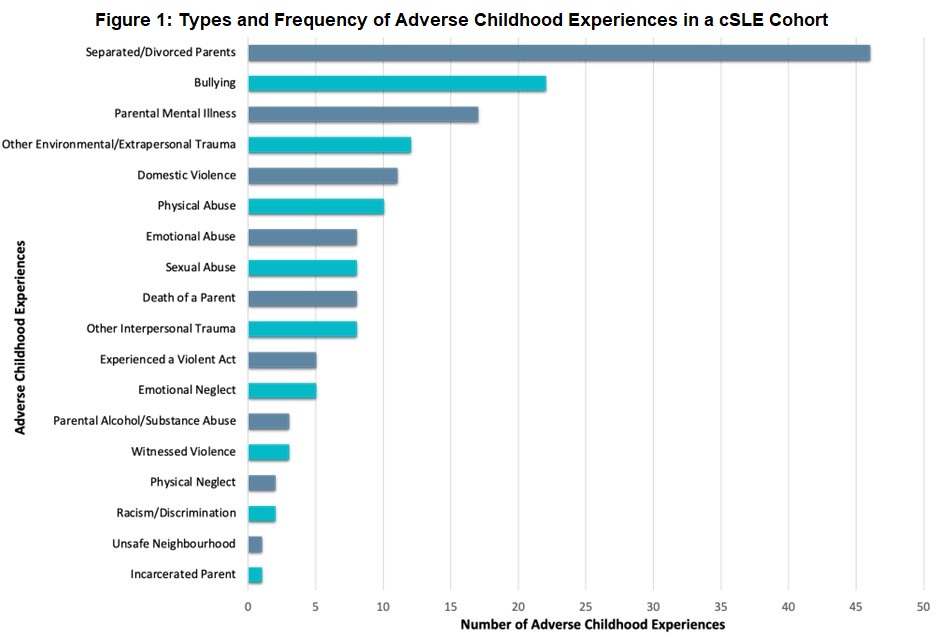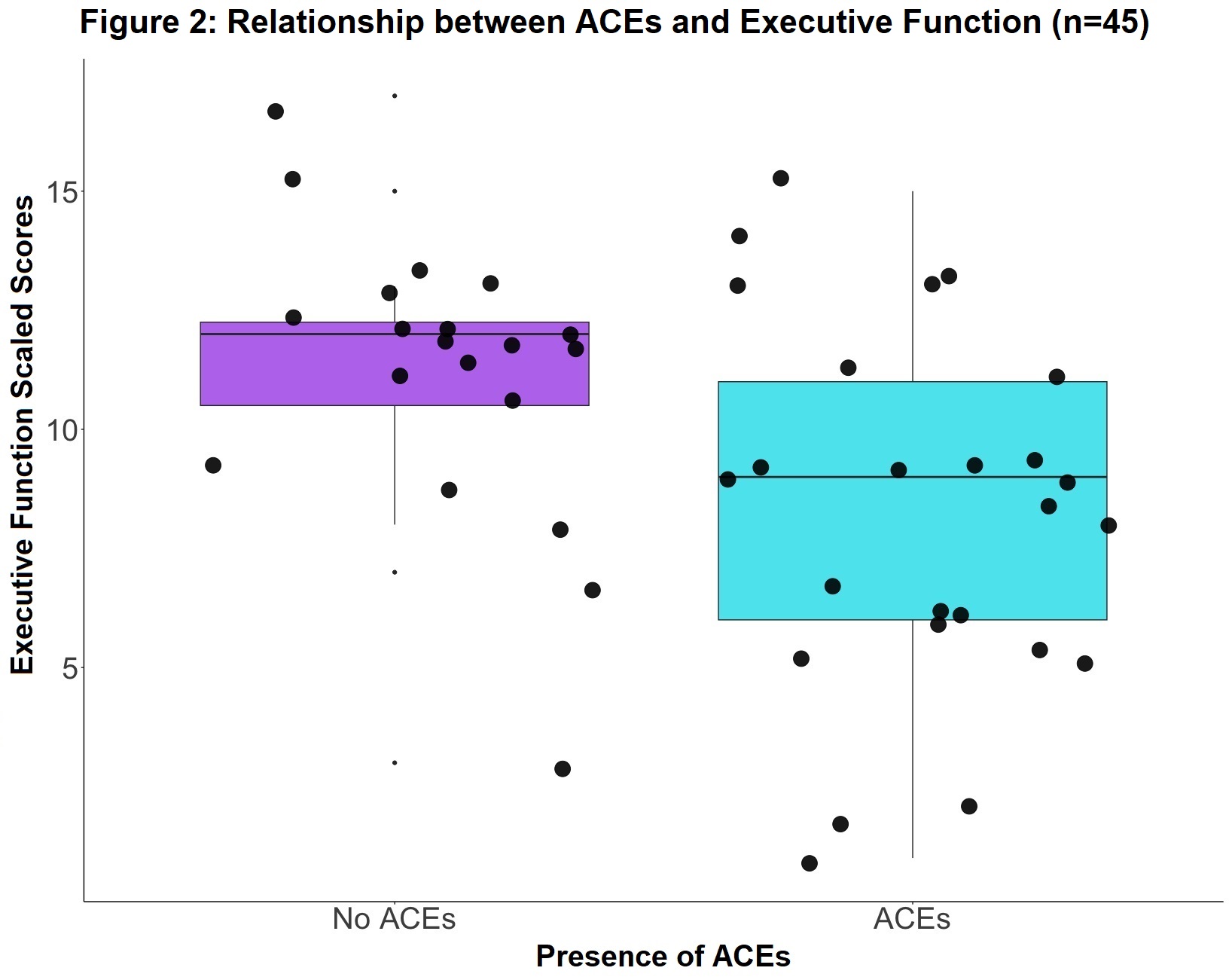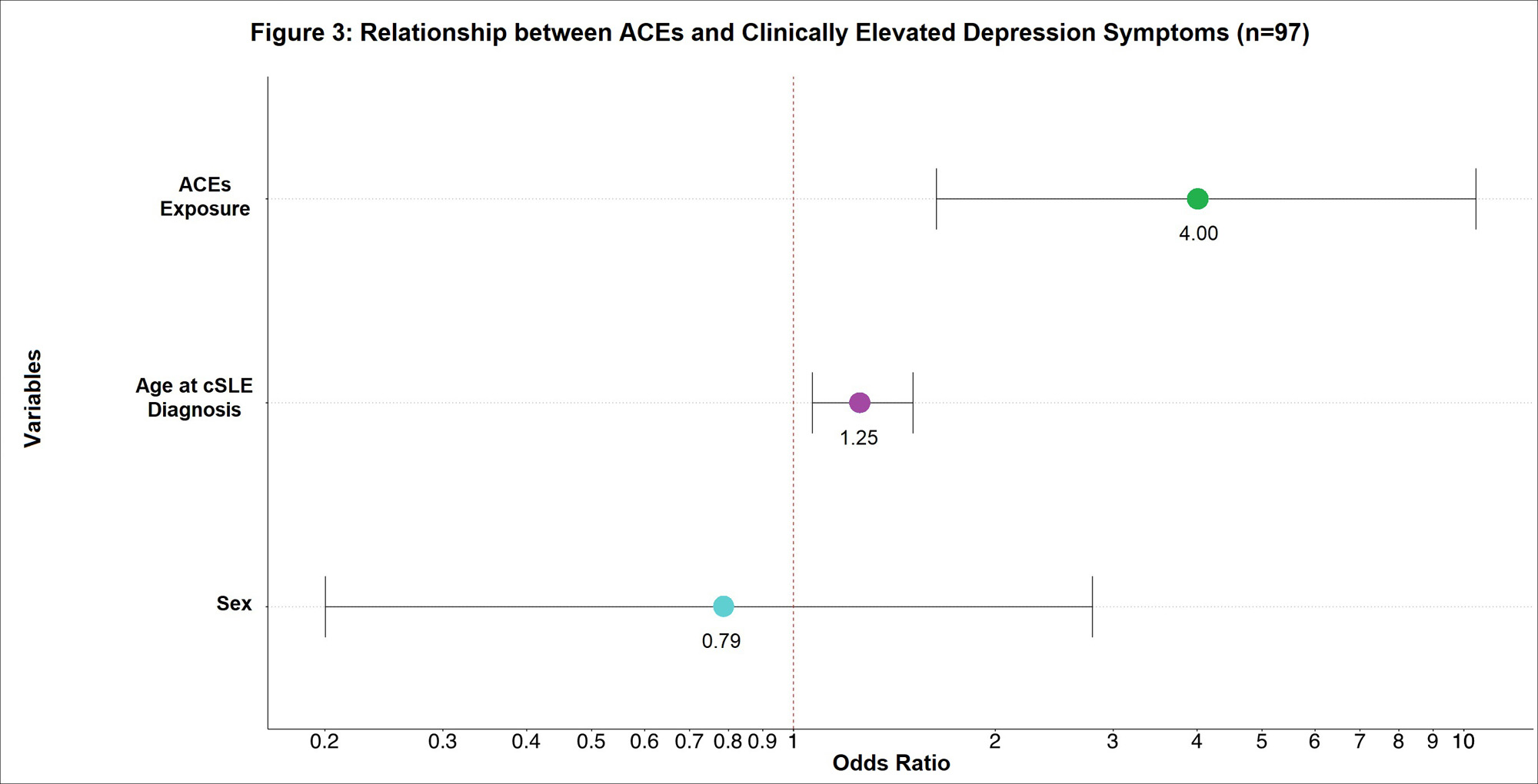Session Information
Date: Monday, November 13, 2023
Title: (1221–1255) Pediatric Rheumatology – Clinical Poster II: Connective Tissue Disease
Session Type: Poster Session B
Session Time: 9:00AM-11:00AM
Background/Purpose: Systemic lupus erythematosus (SLE) is a chronic, multiorgan autoimmune disease in which 20% of cases are diagnosed in childhood. Adverse childhood experiences (ACEs) are traumatic events or experiences occurring in childhood. While adult SLE patients with a history of ACEs report higher levels of depression, ACEs’ more immediate impact on adolescents with childhood-onset SLE (cSLE) is unknown. Research posits that ACEs and cSLE can be detrimental to the rapidly developing adolescent brain as they are both associated with an increased risk of cognitive impairment and mood disorders. This study aims to: 1) determine the prevalence of ACEs and 2) examine the relationship between ACEs and cognitive performance and mood disorder symptoms in cSLE.
Methods: We conducted a retrospective cohort study of participants ages 10-18 years who met the ACR or SLICC classification criteria for SLE. We identified 18 types of ACEs according to the CDC-Kaiser and Philadelphia ACEs frameworks through electronic medical records and responses from the PTSD section of the Kiddie-Schedule for Affective Disorders and Schizophrenia (K-SADS). Outcomes of interest were: i) executive function (EF, measured by the Delis-Kaplan Executive Function System (D-KEFS)), ii) depression (Beck Depression Inventory-II (BDI-II), Children’s Depression Inventory-II (CDI-II) and Center for Epidemiological Studies Depression Scale for Children (CES-DC)), and iii) anxiety (Screen for Childhood Anxiety and Related Emotional Disorders (SCARED)), each available for subsets of the cohort. We tabulated the prevalence, types, and timing of ACEs. Multivariable regression analyses examined the relationship between binary ACEs exposure and EF (D-KEFS scaled scores) and the presence of clinically elevated depression and anxiety symptoms; all models were adjusted for sex and age at cSLE diagnosis.
Results: The study involved 224 patients; 85% were female, and 83% identified as non-white, with a median age at diagnosis of 13.2 (IQR 4.4) years and a median disease duration of 2.7 (IQR 5.9) years. Forty-one percent (n=92) of the cohort had at least one documented ACE, of which 60% (n=37) had ≥2 ACEs; 55% of these ACEs occurred before cSLE diagnosis. Of all ACEs types, parental separation/divorce, bullying, and parental mental illness were the most frequent (Figure 1). Multivariable linear regression analysis (sample n=45) showed a significant association between ACEs exposure and worse EF performance on D-KEFS (β = -2.93, 95% CI [-5.04, -0.82], p = 0.008) (Figure 2). ACEs exposure was significantly associated with clinically elevated depression symptoms (OR = 4.00, 95% CI [1.63, 10.43], p = 0.003, sample n=97) (Figure 3). No association was found between ACEs exposure and clinically elevated anxiety symptoms (OR = 1.07, 95% CI [0.47, 2.46], p = 0.868, sample n=99).
Conclusion: ACEs negatively impact EF performance and mental health in children and adolescents with SLE. Further investigation is required into the neuropsychiatric consequences of ACEs and potential biological pathways that enable these deleterious outcomes in youth with cSLE and other chronic illnesses.
To cite this abstract in AMA style:
Fevrier S, Hendrikx O, Danguecan A, Jeyanathan A, Ng L, Mohamed I, Moaf P, Ayyash S, DeCoste C, Levy D, Hiraki L, Knight A. Adverse Childhood Experiences in a Paediatric Systemic Lupus Erythematosus Cohort [abstract]. Arthritis Rheumatol. 2023; 75 (suppl 9). https://acrabstracts.org/abstract/adverse-childhood-experiences-in-a-paediatric-systemic-lupus-erythematosus-cohort/. Accessed .« Back to ACR Convergence 2023
ACR Meeting Abstracts - https://acrabstracts.org/abstract/adverse-childhood-experiences-in-a-paediatric-systemic-lupus-erythematosus-cohort/



